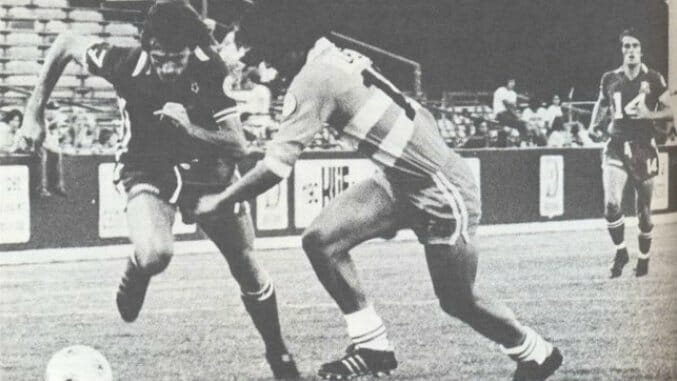Throwback Thursday: Rochester Lancers vs Dallas Tornado (September 1st, 1971)
Photo via TheChive.com
When I was a kid I went to a Cubs game that seemed like it would never end. I parked myself in the bleachers for a night game against the Astros on a deceptively cool evening in the middle of July. The Cubs jumped out to a comfortable lead in the 4th, lost it just a few innings later, and managed to tie it up to force extra innings. And the game went on. And on. And on. And on. It went on so long that, in the middle of the 14th, Harry Carey got on the PA and tried half-heartedly to lead a second 7th Inning Stretch. By then it was after midnight and the crowd had mostly thinned out. Those that remained weren’t in the mood to sing. The failed to get on the board in the bottom of the 14th and I had enough. I made incredible time on the L and got home in time to see the bottom of the 15th. The Cubs had given up two runs while I was on my way home. I saw the final outs on television while climbing into bed. I was asleep within 10 minutes of handshakes.
There’s a peculiar kind of fatigue that sets in during sports games that go on for far too long. It doesn’t really matter what sport it is— you know roughly when a game should end, even if it needs overtime to settle, and when it breaches that decorum a very particular kind of helpless despair grabs hold of you and doesn’t let go.
This week we remember one of the longest soccer games ever played— the Rochester Lancers vs the Dallas Storm, clocking in at an obscene 176 minutes, 45 years ago today.

First, it’s worth noting the particulars of NASL competition in the early 70s. NASL officials were thoroughly convinced the way European leagues did things would turn off American fans, so they tweaked things in an effort to spice things up. The league was split into a northern and southern division with four teams each. Clubs earned six points for a win, three for a draw, and additional points for every goal scored (capped at three). NASL also had playoffs, because America. Only four teams qualified for the playoffs. Finishing 1st in your division earned you a playoff berth against the 2nd place team in the other division. Aggregate score wasn’t used; playoffs were organized in in Best-Of-3 series. Most crucial to this particular story was the overtime rules, which were similar to how the NHL does things— overtime until one team scored a goal, with breaks every 15 minutes.

Rochester, who were the defending champions heading into the playoffs, were matched against Dallas for the semifinals. They hosted the first game at what was then called the Aquinas Memorial Stadium. It had a capacity of 20,000. Only 8,000 showed up to cheer on the Lancers in this crucial game, but it was a festive mood, with wine and pizza being passed around surreptitiously.
Lancers forward Manfred Seissler gave the home side the lead in the 18th minute off a throw-in. Rochester held that lead for much of the game and looked set to close things out before Tony McLoughlin headed in the equalizer in the 84th minute. The game ended level after 90 minutes and both teams prepared for overtime. Or, rather, they tried. Nothing could’ve prepared them for what happened.
The game initially kicked off at 8pm. Overtime started at 10pm. And the game went on. And on. And on. And on. And on.
Back then, teams were only allowed two substitutions. Haitian forward Edner Breton came on for the Lancers in the 95th minute and expected to put in 10, maybe 20 minutes. He ended up playing 81 minutes.
At one point in overtime a player developed a muscle cramp and couldn’t continue. But his team were out of substitutions and couldn’t afford to go down a man. So he hung out in the center circle and acted as a sort of ball relay— he’d collect the ball if it came near him and he’d hit a short pass forward. Fans cheered every time he got a touch.
-

-

-

-

-

-

-

-

-

-

-

-

-

-

-

-

-

-

-

-

-

-

-

-

-

-

-

-

-

-

-

-

-

-

-

-

-

-

-

-








































